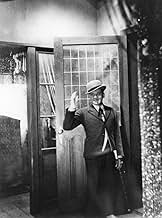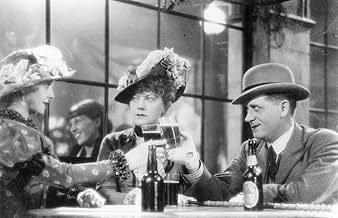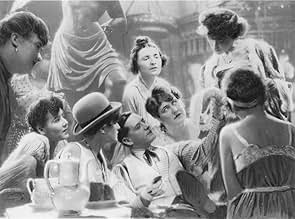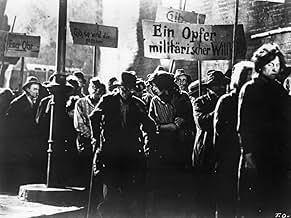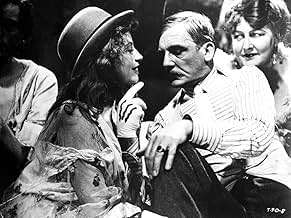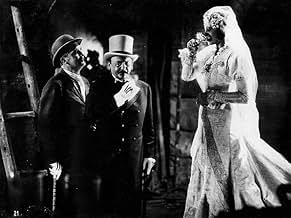Le gangster Macheath épouse secrètement la fille du roi des mendiants Peachum. Quand Peachum l'apprend, il demande au chef de police Brown d'arrêter et de pendre Macheath. Autrement, tous le... Tout lireLe gangster Macheath épouse secrètement la fille du roi des mendiants Peachum. Quand Peachum l'apprend, il demande au chef de police Brown d'arrêter et de pendre Macheath. Autrement, tous les mendiants de Soho perturberont le couronnement à venir.Le gangster Macheath épouse secrètement la fille du roi des mendiants Peachum. Quand Peachum l'apprend, il demande au chef de police Brown d'arrêter et de pendre Macheath. Autrement, tous les mendiants de Soho perturberont le couronnement à venir.
- Réalisation
- Scénario
- Casting principal
- Récompenses
- 1 victoire au total
- Jenny
- (as Lotte Lenja)
- Polly Peachum
- (as Mlle. Florelle)
- Smith
- (as Wladimir Sokoloff)
- Chanteur de rues
- (as Bill-Bocketts)
- Mendiant
- (as Gaillard)
Avis à la une
This eternal masterpiece doesn't paint a rosy picture of human affairs, with a city (pars pro toto – the world) in the hands of people with shark teeth, venal civil servants and a corrupt police force. Bertolt Brecht formulates in simple words the rules of the game, the basics of human society: first grub, then morals. If the primary conditions for human survival (food, safety) are not available, then there is absolutely no ground for any kind of morality. For Bertolt Brecht, in a 'free for all' society the poor, the vast majority of the population, can only survive by (organized) begging and stealing, by dirty works ('Missetat'). After fighting one another, the crime bosses find a far better solution for the consolidation of their power. They make a super deal, pool their resources and create a financial syndicate of criminals, in other words, a bank, with the former corrupt police chief as CEO. What an awesome prophetic idea! With brilliant theatrical histrionics and a perfect 'London' atmosphere, G.W. Pabst shot an ageless movie masterpiece based on an everlasting opera. A must see.
5 out of 5 - Essential
"Die 3 Groschen-Oper" is a cynical musical with low-life characters in the underground of London written by Bertold Brecht and directed by Georg Wilhelm Pabst. This film was released in Berlin on 19 February 1931 and I saw a DVD with a matrix that was restored in 2006 for the 75th anniversary of this film. In 1986, the Brazilian composer Chico Buarque de Holanda and the director Ruy Guerra released an adaptation of this musical with the successful "Ópera do Malandro", the most expensive Brazilian production until 1986, but without the credit to Bertold Brecht. My vote is eight.
Title (Brazil): "A Ópera dos Três Vinténs" ("The Opera of Three Pennies")
The Guild Of Thieves' leader gets married to the Guild of Beggars' leader's daughter, causing friction between the two highly organised and respected professions, but inertia in the police who are in the Thieves' power. Prostitution, aberration, bigamy, thievery, extortion, bribery, corruption (and complete cynically cheerful indifference to it all), you name it it's here - after all it is all that Man can do! Laconic-looking Ernst Busch's searing inter-ditties leave you with the distinct impression that someone was rather tired with the world! The savage sounding German words spew out, whilst reading the English subtitles is sometimes heavy going in digesting all of the conceptual opinions in time to digest the next. Would that Bobby Darin had got his tonsils round a few more of the extraordinary gossamer Brecht/Weill songs from this! Lotte Lenya sparkled doing her Pirate Jenny number, being just a part of my favourite bit in the idling whorehouse.
All of the people involved in 3G are "lost to sight", except to the handful of Artheads who occasionally hold cultural revivals of Weill, Brecht or Pabst. There was a memorable series of events in London in 2000 to mark the 50th anniversary of Weill's death, but 99.99% of the general public passed it by.
Soon we will all be lost to sight too, along with all of our fractious opinions and silly vices.
I wonder if some of the disjointed sequences and odd pacing of the movie result from the fact that it's a reconstruction, the original having gone the way of all entartete art in Nazi Germany.
Le saviez-vous
- AnecdotesThe film was banned by the Nazi Party in 1933 and prints of the film were destroyed. The film was restored and reconstructed in the 1960s.
- Citations
Peachum: You too wish to be part of this splendid occasion. You, poorest of the poor, who'd long ago have perished in the sewers of Turnbridge if I hadn't spent sleepless nights devising a way to wring a few pence out of your poverty. For I've shown that the rich of this world have no qualms about causing misery but can't bear the sight of it. They have hard hearts but weak nerves. Well, we won't spare their nerves today! By the thousands we'll tear at their nerves, for our rags do not conceal our wounds!
- Versions alternativesThere is an Italian edition of this film on DVD, distributed by DNA srl, "L'OPERA DA TRE SOLDI (1931) + HANGMEN ALSO DIE (Anche i boia muoiono, 1943)" (2 Films on a single DVD), re-edited with the contribution of film historian Riccardo Cusin. This version is also available for streaming on some platforms.
- ConnexionsFeatured in Nur zum Spaß, nur zum Spiel (1977)
- Bandes originalesLa Complainte de Mackie
(Die Moritat von Mackie Messer)
Music by Kurt Weill
German lyrics by Bertolt Brecht
French lyrics by André Mauprey
Performed by Florelle
Meilleurs choix
- How long is The Threepenny Opera?Alimenté par Alexa
Détails
- Durée1 heure 44 minutes
- Couleur
- Rapport de forme
- 1.20 : 1
- 1.33 : 1
Contribuer à cette page


